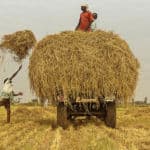Feeding the Future of Aquaculture – One Insect at a Time
How our social enterprise hopes to revolutionize the fish feed industry and increase food security
Aquaculture, or fish farming, is the world’s fastest-growing form of animal food production, having overtaken beef in 2011. While worldwide fisheries have been all but depleted, aquaculture holds the immense potential to provide a growing population with a cheap and sustainable source of protein.
However, as it is currently practiced, the aquaculture industry is dangerously unsustainable. The problem lies in the production of the feed for these farmed fish. It might surprise you to learn that the main source of protein in fish food is, in fact, fish. Small, low-value wild fish such as anchovies, herrings and sardines are caught in the ocean using destructive methods such as dynamite fishing and trawling. These forage fish are then ground up into fish meal, which is in turn incorporated into pellets that are fed to higher-value farmed fish such as salmon, trout and tilapia. Approximately 30 percent of all wild-caught fish is used for fishmeal. We’re feeding fish to fish and it doesn’t make sense.
Alternative sources of protein currently being used come with their own host of problems. Soybeans, among the best plant-based sources of protein, are typically grown on large mono-culture farms using chemical fertilizers. The greatest growth of soybean production is in South America, especially Brazil, where soybean farms are exacerbating deforestation and displacing native communities.
So, while aquaculture has the potential to circumvent the downfall of commercial fishing, the reality is that it is merely exacerbating the problem. If farmed fish are to become a sustainable source of food in the future, we need to find an alternative protein base with which to manufacture the feed.
As a business student at the University of Michigan with a commitment to sustainable development, I saw a business opportunity here. I co-founded Kulisha with Viraj Sikand, an environmental science student at Brown University. Kulisha is a social venture based in Nairobi, Kenya, guided by a simple question: Why not grow and process insects into an alternative protein base to replace fishmeal? Insects are abundant, require little land and water to raise, and are rich in nutrients essential for fish growth. And, young fish in the wild naturally eat insects – not ocean-caught anchovies. One particular type of insect native to temperate regions of the world holds a lot of promise for use in animal feeds.
Meet the black soldier fly. Unlike other insects, black soldier fly larvae can eat a variety of organic waste, including fruit and vegetable scraps, spent grains from breweries, and chicken manure, thereby diverting trash from the landfill. Kulisha plans to grow, harvest, dry and grind the larvae into a protein-rich meal, and then formulate a high-quality pellet feed for fish farmers.
Simultaneously, Kulisha is tackling another problem. Kenya’s aquaculture industry is booming, growing at 10 percent a year. But there is a dearth of low-cost, high-quality feed in the country. In one survey, numerous fish farmers reported that feed alone consumed up to 60 percent of their total costs. Manufactured feeds are not widely available. As a result, farmers are mixing fishmeal on-site in small batches along with local crops, a process that is both inefficient and nutritionally inadequate. Even when farmers are able to purchase feed it is not uncommon for a single sack to be up to 30 percent gravel. This lack of adequate feed is holding back the industry from achieving its full potential and holding back fish farmers, many of whom live in borderline poverty themselves.
This idea has resonated with business and innovation competitions, and we have been fortunate enough to win a number of grants and awards, including the Michigan Business Challenge, the Thought For Food Challenge and the Social Innovation Fellowship at Brown University.
We also have recruited three other members to build a strong team with diverse experiences and skill sets. Arjun Paunrana, from Nairobi, is studying mechanical engineering at UCLA and is spearheading the design of our proprietary system. Lunalo Cletus, also from Nairobi, studied natural resource management at the University of Nairobi and is conducting market research. Maya Faulstich-Hon, also studying environmental science at Brown University, is conducting small-scale prototypes. Among our team of five, four of us are currently undergraduate students and while we have received invaluable support and mentorship from our respective institutions, it has certainly been challenging to start a business remotely while juggling classes and homework as well.

The Kulisha management team from left to right: Viraj Sikand, Eric Katz, Maya Faulstich-Hon and Arjun Paunrana.
This summer, the team will congregate in Kenya and implement the money we have raised thus far to build a production facility and begin the growing process. We’ve partnered with Sagana, the largest hatchery and tilapia farm in Kenya, and by the end of the summer we hope to begin feed trials with researchers there. Though the four of us, will have to leave Kenya at the end of the summer to finish our university studies, we hope to continue R&D through experimental trials and continued prototyping at our universities.
We at Kulisha envision a future where food security and economic development are not at odds with the well-being of our environment. Who knows? Black soldier flies may just be the first step to realizing this vision.
Top image: Black soldier fly larvae, an ideal source of fish food, also can eat a variety of organic waste, including fruit and vegetable scraps. (Image courtesy of Kulisha).
Eric Katz is the co-founder of Kulisha and entering his senior year at the University of Michigan. For the last two years he also has served as the editorial assistant for NextBillion.net.
- Categories
- Agriculture, Environment, Social Enterprise



